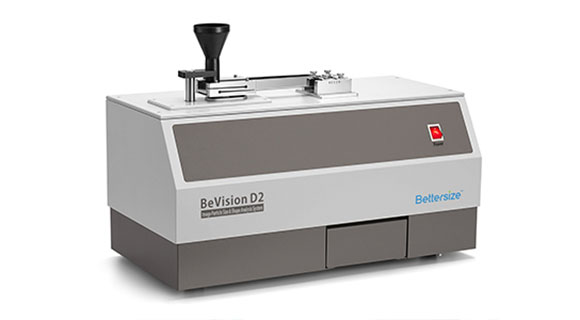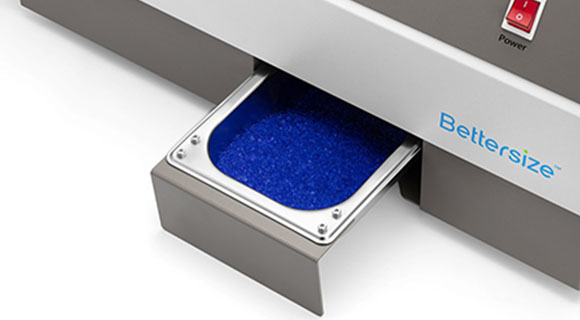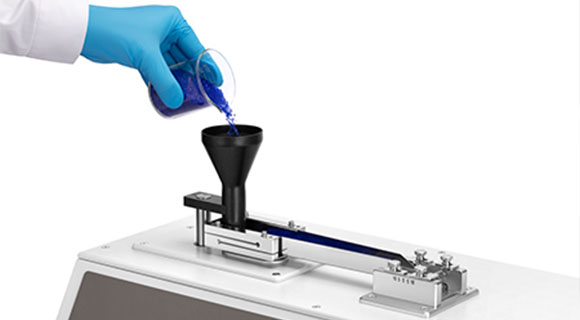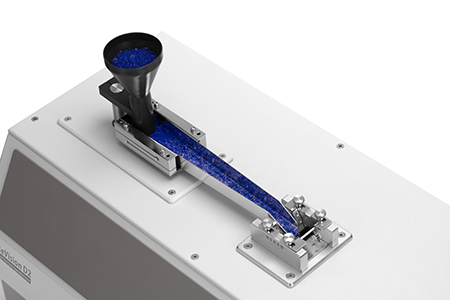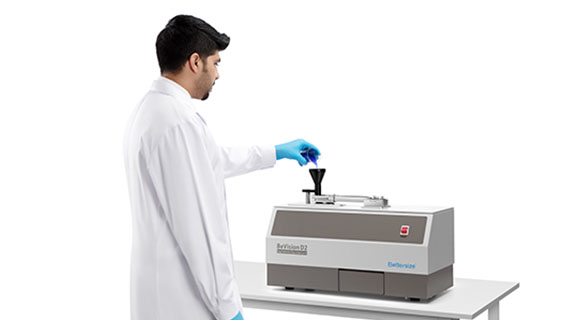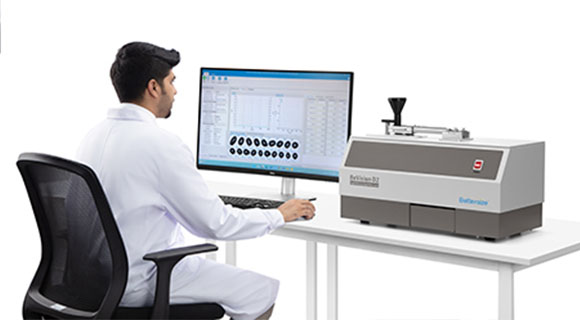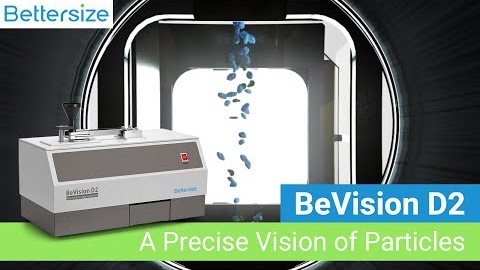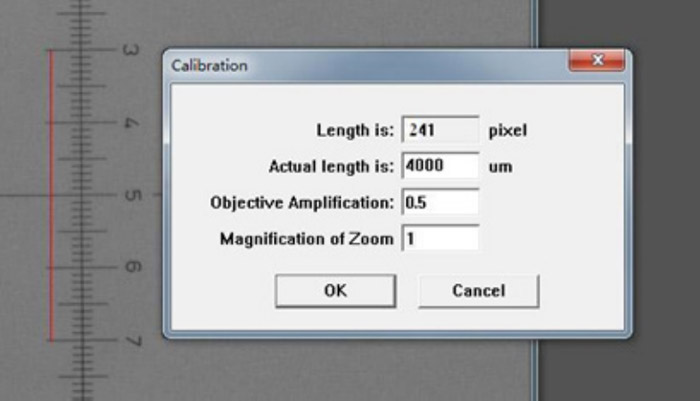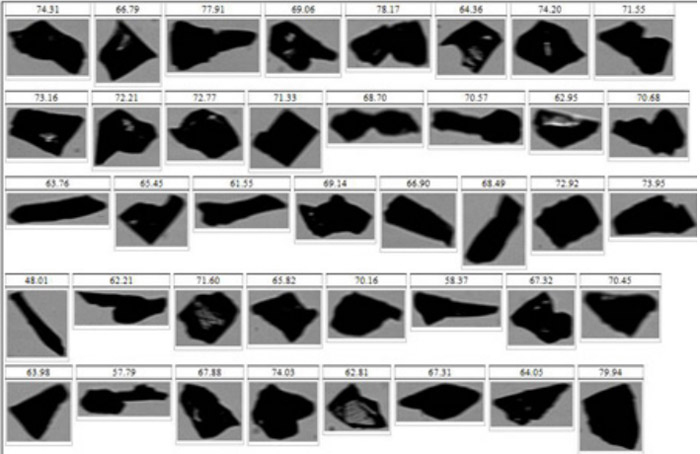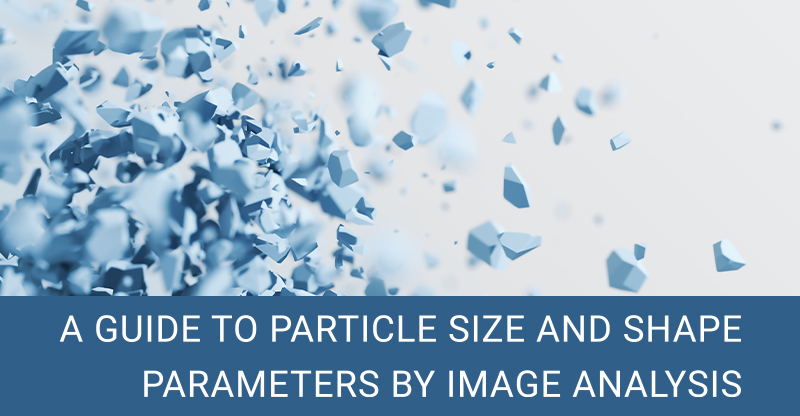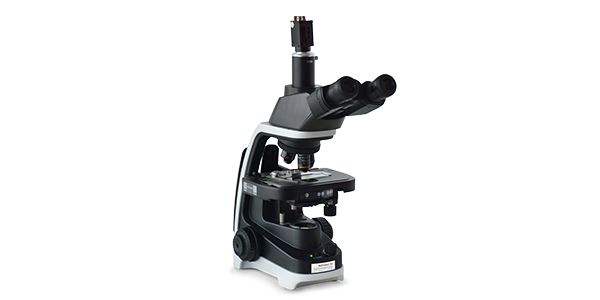BeVision D2は、乾燥した流動性の高い粉体や顆粒の粒度・形状分析に効率的なソリューションを提供します。BeVision D2では、数万個の粒子を3分以内に測定できます。高速度カメラと精密なテレセントリックレンズを組み合わせたBeVision D2は、30~10,000 μmの粒子径と形状を効率的に分析できます。
機能と利点
- ● 測定範囲30 - 10,000 µm
- ● 24種類の粒子径と形状のパラメータ
- ● 高いサンプルスループット:3分以内に10,000個の粒子を測定
- ● 卓越した再現性
- ● ISO 9276-6に準拠した結果
- ● 完全自動運転
- ● 強力なソフトウェアが包括的な評価を提供
- ● ふるい分け結果と同等
ビデオ
How to Install and Operate BeVision D2 
BeVision D2 | A Precise Vision of Particles 
What is Image Analysis? Fundamentals of BeVision Series 
Overview of BeVision Series | Precision in Particle Vision 
概要
1) なぜ画像解析法なのか?
- 簡単
粒子の画像を取り込み、粒子を特定し、サイズと形状を測定する。画像解析のすべてのステップが簡単で明確です。
- 形状分析
粒子を直視することで、粒子の大きさだけでなく、形状も解析できます。
- 百聞は一見に如かず
画像解析法により、個々の粒子の大きさと形状を判定し、それを合計して統計値を作成します。粒子径や形状分布の詳細を正確に提供することができます。
2) なぜ動的画像解析法なのか?
- 効率
測定ゾーンを通過する連続的な粒子の流れは、測定の高い効率を達成するのに役立ちます。
- 過大粒子に対する感度
動的画像分析法は、過大粒子に対して敏感です。過大粒子のサイズを推定することも可能です。
- 信頼性の高い結果
測定粒子数が最大化されているため、測定結果の統計的有意性が保証されます。
3) BeVision D2ハードウェア:精度と効率性を保証
BeVision D2は、様々なアプリケーションの粒子径と形状を測定するために、包括的なハードウェアを装備しています。サンプルの材料特性に対応し、最適なハードウェアを選択することで、最適な精度と効率で粒子径と形状を測定することができます。
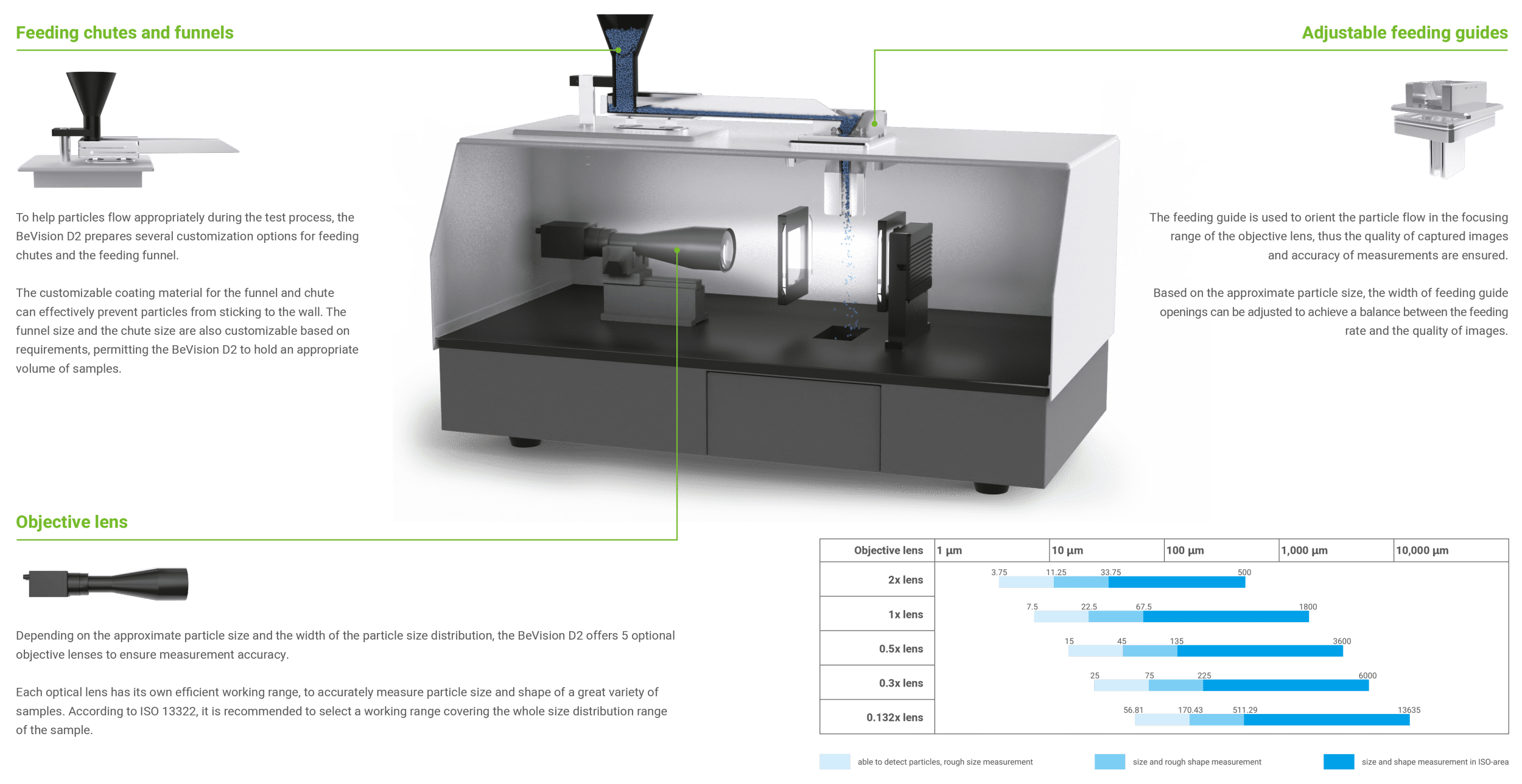
4) 粒径・形状パラメータ:BeVision D2
- 粒子径パラメータ
等価直径:面積-等価直径、周囲長-等価直径;
フェレット直径:最大および最小フェレット直径、XLF(長さ)
Martin diameters: 最大および最小マーチン直径;
Legendre ellipse: 長軸および短軸
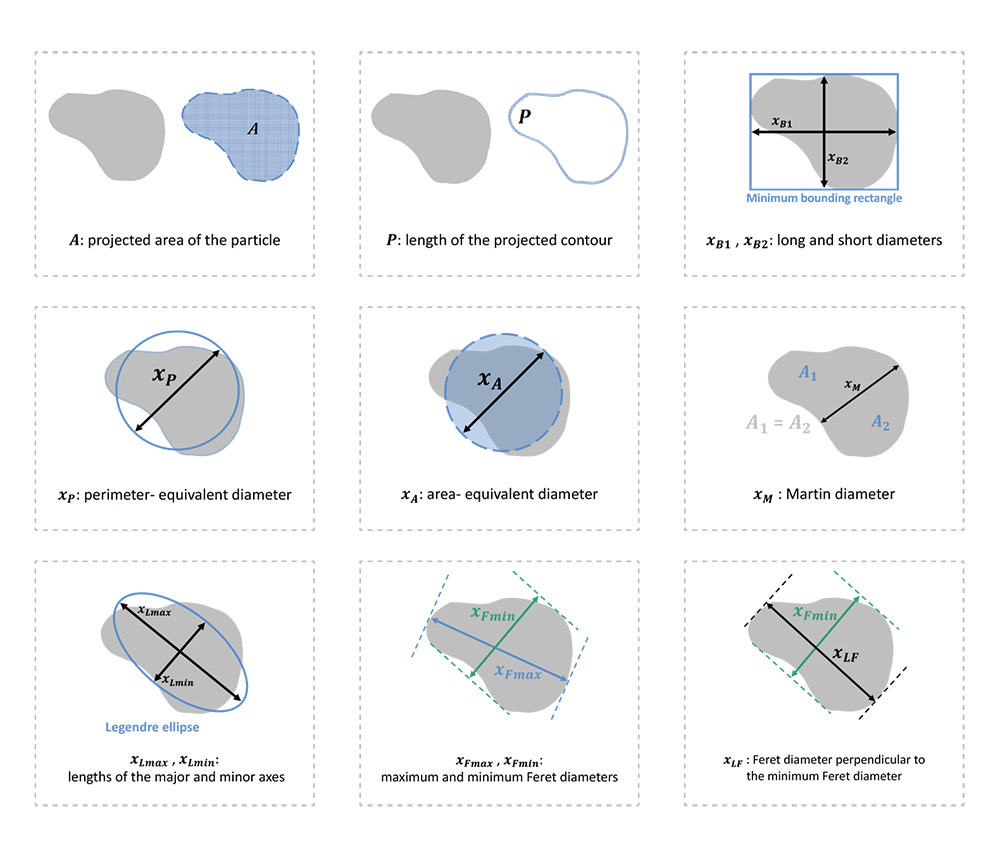
- 形状パラメータ
2方向のサイズ差:アスペクト比、L/W比、楕円比;
円形度、長方形度:円形度、不規則度、コンパクト度、拡張度、ボックス比
輪郭の凹み:
細長い粒子の場合:伸長度、真直度

5) BeVisionソフトウェア:可視化された洞察
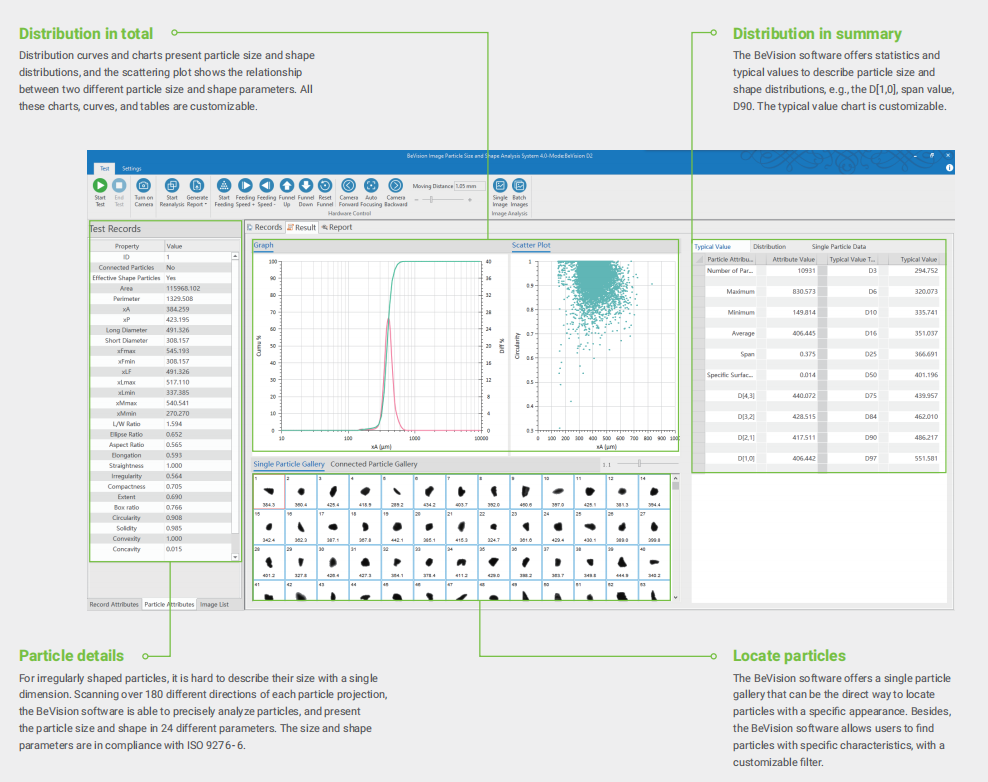
6) 代表的なアプリケーション

Citations
- Bettersizer 2600
Functional redundancy as an indicator for evaluating functional diversity of macrobenthos under the mussel raft farm near Gouqi Island
DOI: 10.1016/j.aquaculture.2023.740024 Read ArticleZhejiang Ocean University | 2024Biological traits analysis (BTA) helps to evaluate the effects of different environmental variables on the traits-based functional composition of macrobenthos. However, research on functional traits of macrobenthos under mussel farming is limited. We investigated the spatial and temporal response of the benthic system in terms of taxonomic and functional diversity to environmental variables of farming and natural stressors resulting from suspended mussel farming near Gouqi Island of eastern China Sea. The functional traits of macrobenthic assemblages under mussel farming were characterized by “medium adult body size”, “vermiform body form”, “high flexibility”, “infauna”, “semi-motile”, “gonochoristic”, “surface deposit-feeders”, “carnivores”, “semi-motile burrowers”, and “tube-dwellers”. Functional redundancy was stable in response to mussel farming stresses among seasons, whereas species diversity showed efficient to evaluate natural variables. Functional diversity was significantly affected by farming stressors rather than natural variables, Further analysis using multivariate methods together with continuous monitoring were highlighted to evaluate the impacts of mussel farming. Our results reinforce the importance of macrobenthic species and functional traits analysis to evaluate human stresses driven impacts in offshore ecosystems. By analysing the environmental variables with different sources, independently, we concluded the main effects of human pressures on macrobenthic community. Such distinction could be particularly effective to isolate variable environmental descriptors and evaluate their effects on functional diversity, making the current approach promising for the evaluation of ecological effects of anthropogenic stressors in aquaculture areas. - Bettersizer 2600
Degradation characteristics and utilization strategies of a covalent bonded resin-based solid amine during capturing CO2 from flue gas
DOI: 10.1016/j.seppur.2023.125621 Read ArticleChina University of Petroleum | 2024In this study, various types of degradation as well as attrition which are possibly encountered in a circulating fluidized bed temperature swing adsorption (CFB-TSA) process, were conducted experimentally to evaluate the stability of a resin-based solid amine sorbent. Other characterizations methods, such as elemental analysis (EA), Fourier transform infrared spectroscopy (FTIR) etc. were applied to further reveal the degradation mechanisms. The results showed that thermal degradation occurs from 140–160 °C due to the decomposition of amine group. The CO2-induced degradation occurs from a higher temperature of 160–180 °C accompanied by the production of urea. Hydrothermal stability is good below 130 °C, but the ionic impurities in steam crystalized on particle surface can accelerate the degradation. Oxidative degradation is the most harmful, which starts at a lower temperature of 70–80 °C with the formation of aldehyde. The existence of H2O in atmosphere can alleviate the oxidative and CO2-induced degradations. The employed sorbent has a very low attrition index of 0.05, which is 1–2 orders lower than typical commercial fluidized bed catalysts. Based on the results of stability evaluation, some design suggestions for proper utilization of this sorbent or other similar resin-based sorbents have been provided in an industrial CFB-TSA process.
- Bettersizer 2600
De-branching of starch molecules enhanced the complexation with chitosan and its potential utilization for delivering hydrophobic compounds
DOI: 10.1016/j.foodhyd.2023.109498 Read ArticleShihezi University | 2024The current study aimed to prepare the complexes between debranched-waxy corn starch and chitosan polymers (DBS-CS), and then investigated their corresponding structural characteristics, rheological property and potent application in Pickering emulsion. The results indicated that the existence of chitosan significantly inhibited starch short-range molecular rearrangement for all DBS-CS samples, which was manipulated by both debranching treatment and chitosan content. Interestingly, this is the first study to reveal that the outstanding peak at 1.8 ppm in 1H NMR spectrum for sample DBS-CS was gradually shifted towards a lower-field region following an increased chitosan content. Moreover, the debranching treatment shifted the crystallinity pattern from A-type to B-type and the relative crystallinity of DBS-CS decreased gradually with the increased content of CS. All samples had a pseudoplastic fluid and shear-thinning behavior with an enhanced shear resistance following the complexation. The DBS-CS was applied in a Pickering emulsion for showing a greater emulsifying stability and a lower gel strength than native NS-CS prepared emulsion. Importantly, the encapsulation ability of curcumin in the DBS-CS emulsion was significantly improved, followed by an increase of 15.45% for its corresponding bioavailability compared to the control. Therefore, this study might highlight a potential carrier for delivering the bioactive substances in a green pattern. - Bettersizer 2600
Heat-induced aggregation behavior of wheat gluten after adding citrus pectin with different esterification degree
DOI: 10.1016/j.foodhyd.2023.109420 Read ArticleGansu Agricultural University | 2024Wheat gluten aggregation during heat treatment is beneficial to the final quality of gluten-based products. Exogenous pectin can affect gluten aggregation. However, the effect of pectin with different degrees of esterification on the heat-induced aggregation behavior of gluten and its possible mechanism are still unclear. Thus, the heat-induced aggregation behavior of gluten after adding pectin with different esterification degree was studied in this study. When the temperature was raised from 25 °C to 95 °C, pectin affected gluten aggregation and was related to the degree of esterification. Specifically, the results of rheological properties and particle size indicated that low-ester pectin improved the viscoelasticity of gluten and promoted gluten aggregation. Thermal properties revealed that enthalpy of gluten added with low-ester pectin (37%) increased from 92.96 J/g to 95.40 J/g during heating process. Structurally, the fluorescence intensity and surface hydrophobicity of gluten added with low-ester pectin (37%) were lower than those added with high-ester pectin (73%). In addition, low-ester pectin (37%) significantly increased the disulfide bond content (from 15.31 μmol/g to 18.06 μmol/g) and maintained β-sheet content of gluten compared with gluten alone at 95 °C, indicating that low-ester pectin was more likely to induce gluten aggregation. However, scanning electron microscope showed that the gluten added with low-ester pectin (46%) exhibited a denser network structure at 95 °C than that added with low-ester pectin (37%). These results will provide a theoretical base for the regulation of gluten aggregation and the quality of gluten-based products by pectin with different esterification degree.
- 1
- 2
- 3
- 4
- 5
- 6
- 84


